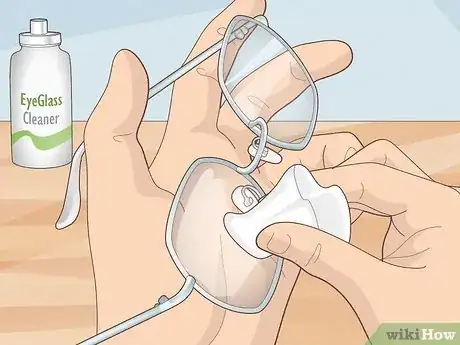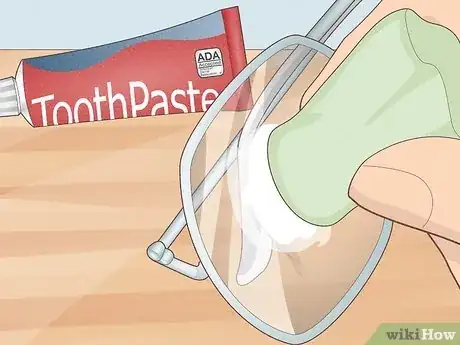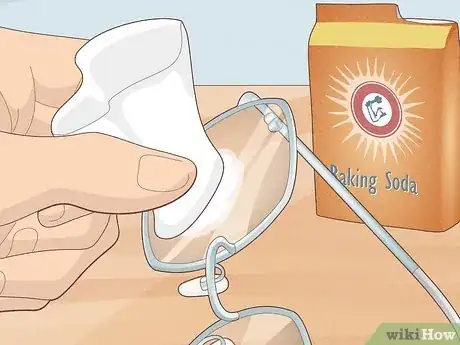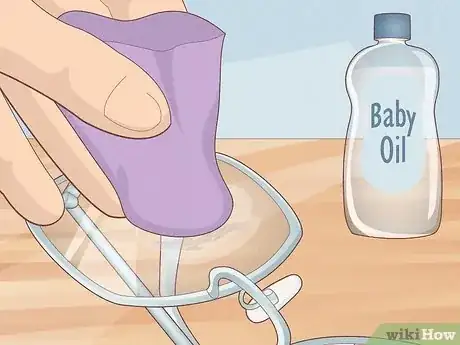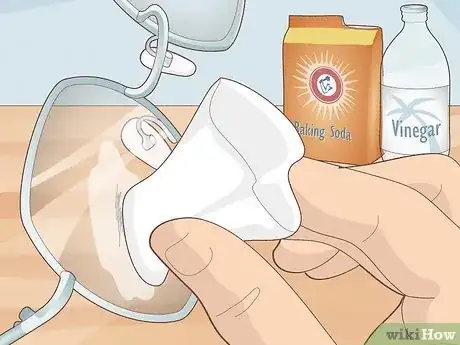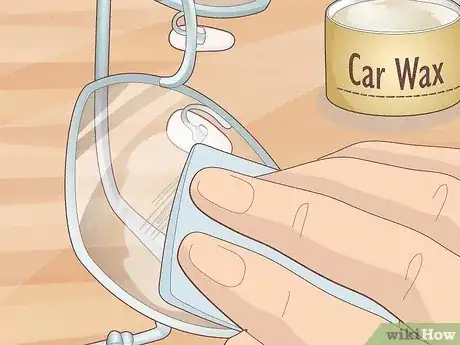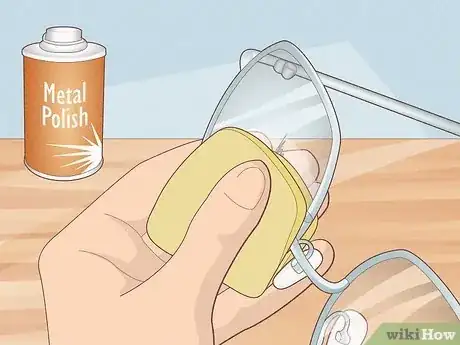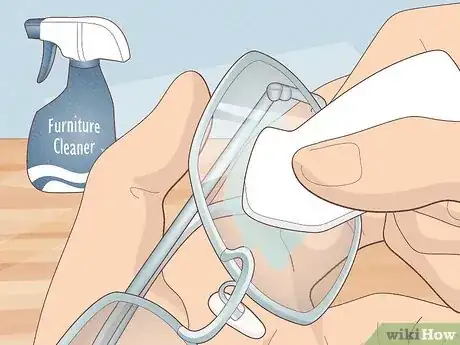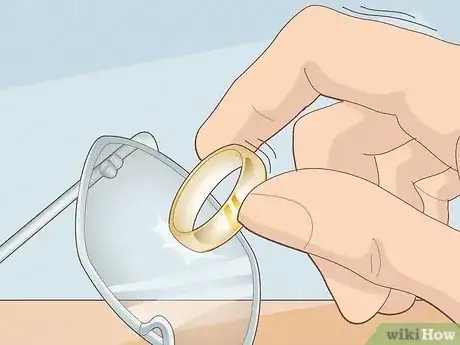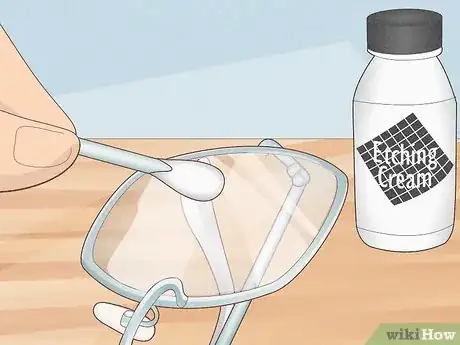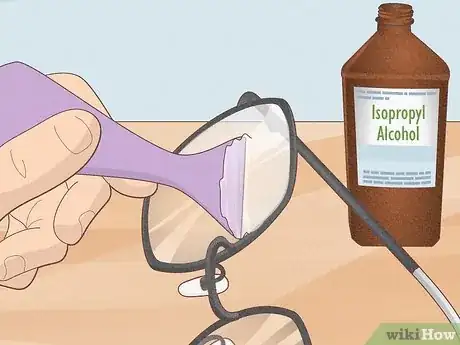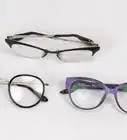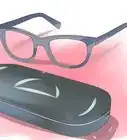This article was co-authored by wikiHow staff writer, Dan Hickey. Dan Hickey is a Writer and Humorist based in Chicago, Illinois. He has published pieces on a variety of online satire sites and has been a member of the wikiHow team since 2022. A former teaching artist at a community music school, Dan enjoys helping people learn new skills they never thought they could master. He graduated with a BM in Clarinet Performance from DePauw University in 2015 and an MM from DePaul University in 2017.
There are 7 references cited in this article, which can be found at the bottom of the page.
This article has been viewed 31,436 times.
Learn more...
Scratched glasses are more than just annoying—over time, they can start to affect your vision and cause headaches, especially if the scratch gets bigger. Thankfully, buffing out light scratches from coated lenses is pretty easy, and you can do it with a variety of household cleaners and materials. We’ve put together a thorough list of ways to fix scratched glasses with coating, as well as instructions on how to remove your coating if all else fails. If you’re ready to see clearly, read on!
Steps
Clean your lenses thoroughly.
-
A basic cleaning can remove light scratches from lens coating. Spray your lenses with an eyeglass cleaner and rub it in with a clean microfiber cloth. Rub the cloth in slow circles over the scratch to remove it. If the scratch remains, always follow this cleaning process before you attempt a different scratch removal method.[1] X Research source
- Only use a cleaner that’s approved for eyeglass lenses. Home glass cleaners for windows or tabletops might be too abrasive for glasses.
Use toothpaste to fill in the scratch.
-
Toothpaste is a great scratch remover with minimal risk of lens damage. Put a dot of toothpaste over the scratch and slowly, gently rub it in circles with a microfiber cloth. Don’t go too fast or hard since this can make the scratch worse. The toothpaste will fill in the scratch and leave your lenses looking the same as before. After rubbing in the toothpaste, rinse the lenses with water to remove residue and then clean them with your regular eyeglass cleaner. [2] X Research source
- It’s very important to use a non-abrasive, non-gel, non-whitening toothpaste—these properties might expand the scratch or cause more damage.
Make a paste of baking soda and water.
-
Baking soda and water creates a scratch filler similar to toothpaste. Combine 2 tablespoons (28.3 grams) of baking soda with a small amount of water to make a thick paste. Gently rub the paste into the scratch in a circular motion with a clean microfiber cloth to fill in the scratch. Rinse away any residue with water and clean your lenses with eyeglass cleaner.[3] X Research source
Rub baby oil into the scratch.
-
Baby oil can buff out light scratches and gently polish coated lenses. Pour a small dot of oil over the scratch and buff it with a microfiber cleaning cloth until the scratch comes out. Afterwards, rinse off the remaining oil and dry. Eyeglass cleaner may be needed to fully remove oil from the lenses after buffing.[4] X Research source
Mix vinegar and baking soda to polish the scratch.
-
White vinegar is great at cleaning plastic and improving scratches. Combine baking soda and vinegar and wait until it stops foaming. Drop some of the mixture onto your lenses and buff away the scratch with a soft cloth. Finish by rinsing and cleaning your lenses.[5] X Research source
- Alternatively, make a paste with white vinegar and powdered mustard. Rub it into the scratch with a cotton ball in a circular motion, then rinse and clean your lenses. Mustard is an eye irritant, so clean thoroughly and avoid touching your face afterwards.[6] X Research source
Buff out the scratch with car wax.
-
Car wax is designed to buff and polish coated surfaces without causing damage. For glasses, it works best on plastic coated lenses. Put a small amount of wax over the scratch. Rub the wax in gentle, slow circles with a microfiber cloth. Once the scratch is gone, rinse off the wax and clean the lenses with eyeglass cleaner.[7] X Research source
- Car or vehicle wax can be bought online, at auto parts stores and mechanics, or at most home goods stores.
Use brass, silver, or metal polish.
-
Liquid metal polish can remove small scratches and stubborn dirt from your lenses. It’s designed to fill in nonporous surfaces, like glass. It works best on small, superficial scratches (especially on mirrored sunglasses). Rub a small amount of polish into the scratch with a clean microfiber cloth. Then, wipe them down with rubbing alcohol.[8] X Research source
- Remove any remaining polish or alcohol with a good rinse. Finish by cleaning your lenses with eyeglass cleaner.
- For minor scratches, try skipping the polish and just apply rubbing alcohol with a microfiber cloth.
Polish the lenses with furniture cleaner.
-
Furniture cleaner contains a compound that helps fill in tiny scratches. Spray a cleaner into a clean rag and then gently rub it into the scratch in a slow, circular motion. Afterwards, rinse off the polish and use eyeglass cleaner to remove any residue.[9] X Research source
Determine if your lenses are glass or plastic.
-
The material of your lenses determines which coating removal method to use. The most reliable way to tell if they’re glass or plastic is to ask your optician at the location you bought your lenses. If you can’t reach them, use these indicators to figure out the lens material:[10] X Research source
- Sound: gently tap the lens against a metal ring. Glass will produce a high-pitched ringing sound, whereas plastic will sound like a low thud.
- Weight: glass lenses are noticeably heavier than plastic ones.
- Temperature: glass lenses will be cold to the touch after they’ve been off your face for a while. Plastic lenses will stay warmer because of their insulating properties.
Remove coating from plastic lenses with etching cream.
-
Removing the protective coating is a last resort to use after everything else fails. The scratch will be gone, but you will lose the anti-reflective or polarizing properties of the coating (the actual lens will be more susceptible to scratching, too). To remove the coating, apply a glass etching cream according to the product instructions. Let it sit for no more than 5 minutes, occasionally scrubbing the surface with a cloth or swab as the instructions say. Wipe the cream away and clean the lenses with soap and water.[11] X Research source
- Most glass etching creams contain sulfuric acid, but products with hydrofluoric acid will work too.
- Be careful not to leave the cream on too long since the acid content can damage your lenses. Carefully review the instructions before applying.
Scrape the coating off of glass lenses.
-
This is another last resort method to use after other remedies fail. The scratch will be gone, but you’ll lose the protective anti-reflection and polarizing qualities of the coating and make your lenses more susceptible to scratching. First, soften the coating by soaking your lenses in a solution of 5 parts isopropyl alcohol and 1 part saltwater. Soak for at least 10 minutes, but a longer soak (up to 60 minutes) will make the scraping easier. Use a plastic scraper to carefully remove the softened coating from your lenses.[12] X Research source
- Do not use glass etching cream on glass lenses. The acid content will severely damage the lenses and you’ll have to get them replaced.
Warnings
- Never use glass etching cream on glass lenses. The acidity will warp the lenses and make them unwearable.⧼thumbs_response⧽
- Removing the protective coating or using harsh chemicals to remove scratches has the potential to make the scratch worse or damage the lenses in other ways. If you’re concerned about damaging your glasses, take them to an eye care professional for repair or replacement.⧼thumbs_response⧽
You Might Also Like



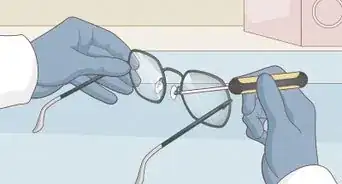
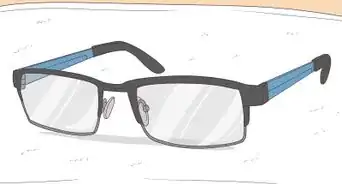
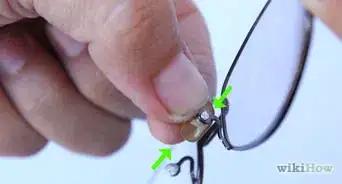
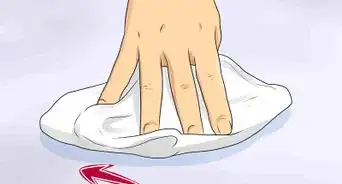
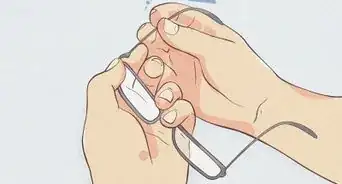
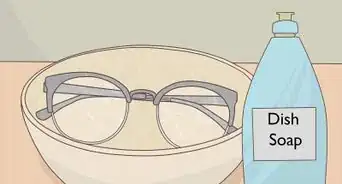

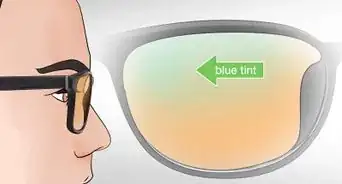
References
- ↑ https://alwaysglasses.com/how-to-fix-scratched-glasses-with-coating/
- ↑ https://alwaysglasses.com/how-to-fix-scratched-glasses-with-coating/
- ↑ https://www.tfrecipes.com/remove-scratch-coating-from-eyeglasses/
- ↑ https://tiphero.com/removing-eyeglass-scratches?ref=tfrecipes
- ↑ https://www.ba-bamail.com/content.aspx?emailid=31758
- ↑ https://tiphero.com/removing-eyeglass-scratches?ref=tfrecipes
- ↑ https://alwaysglasses.com/how-to-fix-scratched-glasses-with-coating/
- ↑ https://tiphero.com/removing-eyeglass-scratches?ref=tfrecipes
- ↑ https://tiphero.com/removing-eyeglass-scratches?ref=tfrecipes
- ↑ https://rx-safety.com/2017/11/ways-tell-if-your-glasses-lenses-made-of-plastic-or-glass-2/
- ↑ https://sciencing.com/remove-antireflective-coating-eyeglasses-7631108.html
- ↑ https://sciencing.com/remove-antireflective-coating-eyeglasses-7631108.html
- ↑ https://www.optometrists.org/general-practice-optometry/optical/guide-to-optical-lenses/scratched-lenses-what-can-i-do/
- ↑ https://www.optometrists.org/general-practice-optometry/optical/guide-to-optical-lenses/scratched-lenses-what-can-i-do/
About This Article

